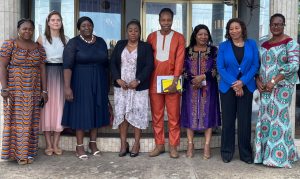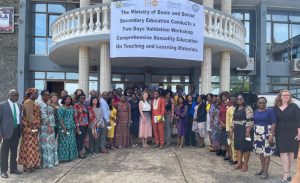MBSSE, Partners meet to validate Comprehensive Sexuality Education Teaching and Learning Materials
The Ministry of Basic and Senior Secondary Education (MBSSE) and partners are on a two-day validation exercise of the Comprehensive Sexuality Education (CSE) Teaching and Learning Materials that will be used from primary one to senior secondary school.
The two-day validation process which started on Tuesday 7th June is taking place at the Shangri La Conference Hall, Lumley Beach Road in Freetown.
The Minister of Basic and Senior Secondary Education Dr David Moinina Sengeh regarded the exercise as an important milestone in his Ministry’s ambitious agenda to contribute to the Government’s Human Capital Development aspirations as articulated in the Medium-Term National Development Plan.
“One of the most effective ways to keep learners in school is to empower them with the knowledge that enables them to make informed decisions about life choices. The role of CSE in this regard enables the protection of learners against unintended pregnancy by providing them with the necessary skills to develop effective decision making and communication skills, explore values and attitudes and be made aware of risk reduction skills,” he said.
According to the Minister, Sierra Leone has one of the highest rates of adolescent pregnancy in the world, noting that according to the 2019 Demographic and Health Survey, 21% of girls aged 15-19 had begun childbearing, adding that child marriage rates are high with 29.6% of women aged 20-24 being married before age 18. He said CSE is a key intervention in combating these statistics by providing learners with the information.
He said the implementation of the CSE involves not only teachers but also parents, schools, communities, service providers, traditional and religious leaders, civil society organisations, and other relevant stakeholders.
“CSE is not new in Sierra Leone, in the past students were able to access this information through Family Life Education, however, it was removed from the curriculum, adding that in order to respond to some of the aforementioned statistics it became necessary to restore the subject,” the Minister said.
He said his team in the Ministry has been working, with United Nations Population Fund (UNFPA) and Irish Aid support to develop a CSE package which is tailored for the context of Sierra Leone.
The UNFPA Deputy Representative Madam Sibeso Mululuma said UNFPA was proud to co-chair the Sexual Reproductive Health taskforce that was set up in 2019 alongside the Ministry’s Chief Education Officer, noting that the validation marks a key point in the Ministry’s journey in rolling out comprehensive sexuality education in Sierra Leone, in line with the recommendations of the Sexual Reproductive Health Task Force.
“UNFPA were proud to support the Ministry in the integration of comprehensive sexuality education into the Basic Education Curriculum Framework. UNFPA remains committed to sustaining its partnership with the Ministry of Basic and Senior Secondary Education in ensuring that CSE is available to young people around Sierra Leone,” she said.
The Deputy Head of Mission at the Embassy of Ireland in Sierra Leone Madam Emma McLoughlin said the introduction of age-appropriate CSE in schools and other learning environments has the potential to increase young people’s life skills and knowledge so that they can make informed choices about their sexual and reproductive health.
“Enhanced education is conducive to more cognisant behaviours, ultimately promoting greater wellbeing, healthier relationships and improved public health outcomes,” she said.
She said in the coming months, they will be supporting the Ministry, through UNFPA’s PROJECT Project, to develop a training trainers manual and conduct training of both trainers and teachers on how to use these teaching and training materials in the classroom.
“The Mission is committed to supporting efforts which contribute to the achievement of targets set out in the Sustainable Development Agenda 2030, especially in Goals 3 which includes ‘Providing universal access to sexual and reproductive healthcare services, including for family planning, information and education, and the integration of reproductive health into national strategies and programmes,” she said.




